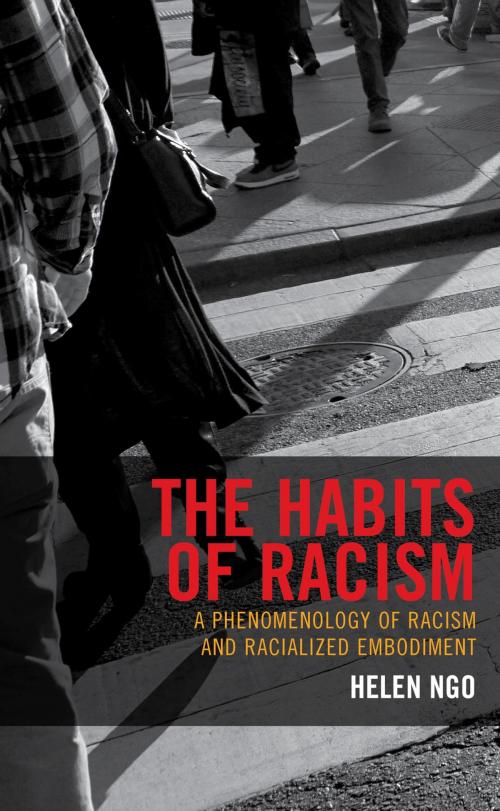The Habits of Racism
A Phenomenology of Racism and Racialized Embodiment
Nonfiction, Religion & Spirituality, Philosophy, Phenomenology, Political| Author: | Helen Ngo | ISBN: | 9781498534659 |
| Publisher: | Lexington Books | Publication: | August 16, 2017 |
| Imprint: | Lexington Books | Language: | English |
| Author: | Helen Ngo |
| ISBN: | 9781498534659 |
| Publisher: | Lexington Books |
| Publication: | August 16, 2017 |
| Imprint: | Lexington Books |
| Language: | English |
The Habits of Racism examines some of the complex questions raised by the phenomenon and experience of racism. Helen Ngo draws on the resources of Merleau-Ponty to show how the conceptual reworking of habit as bodily orientation helps to identify the subtle but more fundamental workings of racism--to catch its insidious, gestural expressions, as well as its habitual modes of racialized perception. Racism, as Ngo argues, is equally expressed through bodily habits, which, once reformulated, raises important ethical questions regarding the responsibility for one’s racist habits.
lived experience of racism and racialization teaches us about the nature of embodied and socially-situated being, arguing that racialized embodiment problematizes and extends existing accounts of embodied experience, and calls into question dominant philosophical paradigms of the “self” as coherent, fluid, and synchronous. Drawing on thinkers such as Fanon, she argues that the racialized body is “in front of itself” and “uncanny” (in the Heideggerian senses of “strange” and “not-at-home”), while exploring the phenomenological and existential implications of this disorientation and displacement. Finally, she returns to the visual register to take up the question of objectification in the racist gaze, critically examining the subject-object ontology presupposed by Sartre’s account of “the gaze” (le regard). Recalling that all embodied being is always already relational and co-constituting, Ngo draws on Merleau-Ponty’s concept of the intertwining to argue that a phenomenology of racialized embodiment reveals to us the ontological violence of racism—not a merely violation of one’s subjectivity as commonly claimed, but also a violation of one’s intersubjectivity.
The Habits of Racism will be of particular value to students and scholars interested in critical philosophy of race, phenomenology, and social and political philosophy, and may also be of interest to those working in feminist philosophy, queer studies, and disability studies.
The Habits of Racism examines some of the complex questions raised by the phenomenon and experience of racism. Helen Ngo draws on the resources of Merleau-Ponty to show how the conceptual reworking of habit as bodily orientation helps to identify the subtle but more fundamental workings of racism--to catch its insidious, gestural expressions, as well as its habitual modes of racialized perception. Racism, as Ngo argues, is equally expressed through bodily habits, which, once reformulated, raises important ethical questions regarding the responsibility for one’s racist habits.
lived experience of racism and racialization teaches us about the nature of embodied and socially-situated being, arguing that racialized embodiment problematizes and extends existing accounts of embodied experience, and calls into question dominant philosophical paradigms of the “self” as coherent, fluid, and synchronous. Drawing on thinkers such as Fanon, she argues that the racialized body is “in front of itself” and “uncanny” (in the Heideggerian senses of “strange” and “not-at-home”), while exploring the phenomenological and existential implications of this disorientation and displacement. Finally, she returns to the visual register to take up the question of objectification in the racist gaze, critically examining the subject-object ontology presupposed by Sartre’s account of “the gaze” (le regard). Recalling that all embodied being is always already relational and co-constituting, Ngo draws on Merleau-Ponty’s concept of the intertwining to argue that a phenomenology of racialized embodiment reveals to us the ontological violence of racism—not a merely violation of one’s subjectivity as commonly claimed, but also a violation of one’s intersubjectivity.
The Habits of Racism will be of particular value to students and scholars interested in critical philosophy of race, phenomenology, and social and political philosophy, and may also be of interest to those working in feminist philosophy, queer studies, and disability studies.















